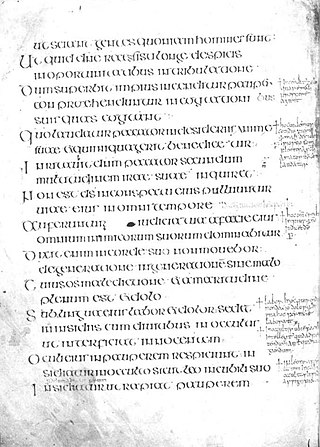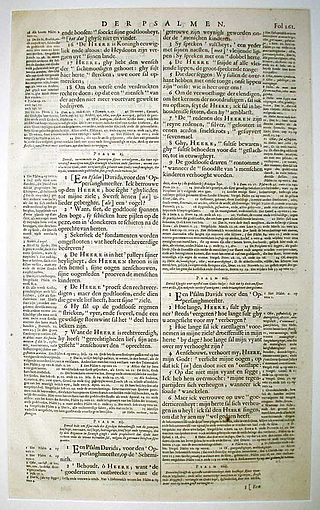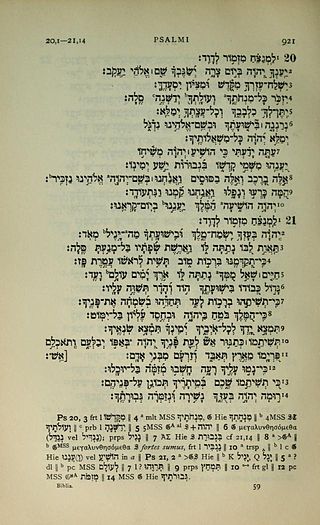Hast or HAST may refer to:
Hast or HAST may refer to:

The word thou is a second-person singular pronoun in English. It is now largely archaic, having been replaced in most contexts by the word you, although it remains in use in parts of Northern England and in Scots. Thou is the nominative form; the oblique/objective form is thee ; the possessive is thy (adjective) or thine ; and the reflexive is thyself. When thou is the grammatical subject of a finite verb in the indicative mood, the verb form typically ends in -(e)st, but in some cases just -t.

"Man's best friend" is a common phrase used to describe domestic dogs referring to their multi-millennia long history of close relations, loyalty, friendship, and companionship with humans. The first recorded use of a related phrase is by Frederick the Great of Prussia. It was likely popularized by its use in a poem by Ogden Nash and has since become a common colloquialism.

Psalm 89 is the 89th psalm of the Book of Psalms, beginning in English in the King James Version: "I will sing of the mercies of the LORD for ever". In the slightly different numbering system used in the Greek Septuagint and Latin Vulgate translations of the Bible, this psalm is Psalm 88. In Latin, it is known as "Misericordias Domini in aeternum cantabo". It is described as a maschil or "contemplation".

Matthew 5:26 is the twenty-sixth verse of the fifth chapter of the Gospel of Matthew in the New Testament and is part of the Sermon on the Mount. Jesus has just warned that if you do not reconcile with your enemies a judge is likely to throw you in jail. In this verse Jesus mentions that your debts must be paid completely before one can leave.

"Herzliebster Jesu" is a Lutheran Passion hymn in German, written in 1630 by Johann Heermann, in 15 stanzas of 4 lines, first published in Devoti Musica Cordis in Breslau. As the original headline reveals, it is based on Augustine of Hippo; this means the seventh chapter of the so-called "Meditationes Divi Augustini", presently ascribed to John of Fécamp.
The common table prayer is probably the best known mealtime prayer among North American Lutherans. Several other variations also exist.

Shakespeare's Sonnet 40 is one of the sequence addressed to a well-born, handsome young man to whom the speaker is devoted. In this poem, as in the others in this part of the sequence, the speaker expresses resentment of his beloved's power over him.

Psalm 9 is the ninth psalm of the Book of Psalms, beginning in English in the King James Version: "I will praise thee, O LORD, with my whole heart; I will shew forth all thy marvellous works." In Latin, it is known as "Confitebor tibi, Domine". The topic of the psalm is that the success of evil is only temporary, and in the end, the righteous will endure. Psalm 10 is considered part of Psalm 9 in the Greek Septuagint and in most pre-Reformation Christian Bibles. These two consecutive psalms have the form of a single acrostic Hebrew poem.

Psalm 90 is the 90th psalm of the Book of Psalms, beginning in English in the King James Version: "Lord, thou hast been our dwelling place in all generations". In the slightly different numbering system used in the Greek Septuagint and Latin Vulgate translations of the Bible, this psalm is Psalm 89. In Latin, it is known as "Domine refugium tu factus es nobis in generatione et generatione". It is the opening psalm of Book 4 of the psalms. Uniquely among the Psalms, it is attributed to Moses. It is well known for its reference in verse 10 to human life expectancy being 70 or 80 : it is believed that this verse was the influence for the opening words of Abraham Lincoln's Gettysburg Address.

Psalm 74 is the 74th psalm of the Book of Psalms, beginning in English in the King James Version: "O God, why hast thou cast us off for ever?". In the slightly different numbering system used in the Greek Septuagint and Latin Vulgate translations of the Bible, this psalm is Psalm 73. In Latin, it is known as "Ut quid Deus reppulisti in finem iratus". Subheaded a maschil or contemplation, and a community lament, it expresses the pleas of the Jewish community in the Babylonian captivity. It is attributed to Asaph.
The Prayer of Solomon is a prayer by King Solomon described in 1 Kings 8:22-53 and 2 Chronicles 6:12-42. This prayer is said to have occurred at the dedication of the temple of Solomon, which also became known as the First Temple. The wording and thinking of the prayer have much in common with the language of Deuteronomy.

Psalm 30 is the 30th psalm of the Book of Psalms, beginning in English in the King James Version: "I will extol thee, O LORD; for thou hast lifted me up". The Book of Psalms is part of the third section of the Hebrew Bible, and a book of the Christian Old Testament. In the slightly different numbering system used in the Greek Septuagint version of the Bible and in the Latin Vulgate, this psalm is Psalm 29. In Latin, it is known as "Exaltabo te Domine". It is a psalm of thanksgiving, traditionally ascribed to David upon the building of his own royal palace.

Psalm 8 is the eighth psalm of the Book of Psalms, beginning and ending in English in the King James Version (KJV): "O LORD, our Lord, how excellent is thy name in all the earth!". In Latin, it is known as "Domine Dominus noster". Its authorship is traditionally assigned to King David. Like Psalms 81 and 84, this psalm opens with a direction to the chief musician to perform upon the gittith, which either refers to a musical instrument, a style of performance, or alludes to persons and places in biblical history.

Psalm 10 is the tenth psalm of the Book of Psalms, beginning in English in the King James Version: "Why standest thou afar off, O LORD? why hidest thou thyself in times of trouble?" In the Greek Septuagint and the Latin Vulgate, it is not an individual psalm but the second part of psalm 9, "Ut quid Domine recessisti". These two consecutive psalms have the form of a single acrostic Hebrew poem. Compared to Psalm 9, Psalm 10 is focused more on the individual than the collective human condition.

Psalm 21 is the 21st psalm of the Book of Psalms, beginning in English in the King James Version: "The king shall joy in thy strength". The Book of Psalms is part of the third section of the Hebrew Bible, and a book of the Christian Old Testament. In the slightly different numbering system used in the Greek Septuagint and Latin Vulgate translations of the Bible, this psalm is Psalm 20. In Latin, it is known by the incipit, "Domine in virtute tua". The psalm is attributed to David.

Psalm 139 is the 139th psalm of the Book of Psalms, beginning in English in the King James Version: "O Lord, thou hast searched me, and known me". In Latin, it is known as "Domine probasti me et cognovisti me". The psalm is a hymn psalm. Attributed to David, it is known for its affirmation of God's omnipresence. Alexander Kirkpatrick states that "the consciousness of the intimate personal relation between God and man which is characteristic of the whole Psalter reaches its climax here".

Psalm 44 is the 44th psalm of the Book of Psalms, beginning in English in the King James Version: "We have heard with our ears, O God, our fathers have told us". In the slightly different numbering system used in the Greek Septuagint version of the bible, and generally in its Latin translations, this psalm is Psalm 43. In the Vulgate, it begins "Deus auribus nostris audivimus patres nostri adnuntiaverunt". The psalm was composed by the sons of Korah and is classified in the series of lamentations of the people.

Psalm 60 is the 60th psalm of the Book of Psalms, beginning in English in the King James Version: "O God, thou hast cast us off, thou hast scattered us". In the slightly different numbering system of the Greek Septuagint version of the Bible and the Latin Vulgate, this psalm is Psalm 59. In Latin, it is known as "Deus reppulisti nos et destruxisti nos". It is addressed "to the chief Musician upon Shushan Eduth", referring to the title of a song, presumably identifying the intended melody, mentioned only here and in Psalm 80, and described as "a Michtam of David, when he strove with Aramnaharaim and with Aramzobah, when Joab returned, and smote of Edom in the valley of salt twelve thousand." The heading text in the Revised Standard Version and the New American Bible Revised Edition refers to Aram-Zobah, whereas in the New King James Version the reference is to Zobah. The psalm has been called a psalm of communal lament.

Psalm 88 is the 88th psalm of the Book of Psalms, beginning in English in the King James Version: "O LORD God of my salvation, I have cried day and night before thee". In the slightly different numbering system used in the Greek Septuagint and Latin Vulgate translations of the Bible, this psalm is Psalm 87. In Latin, it is known as "Domine Deus salutis meae". According to the title, it is a "psalm of the sons of Korah" as well as a "maskil of Heman the Ezrahite".

"Heimliche Aufforderung", Op. 27, No. 3, is one of a set of four songs composed for voice and piano by Richard Strauss in 1894. The German conductor Robert Heger orchestrated it in 1929. The text is from a poem in German by John Henry Mackay.